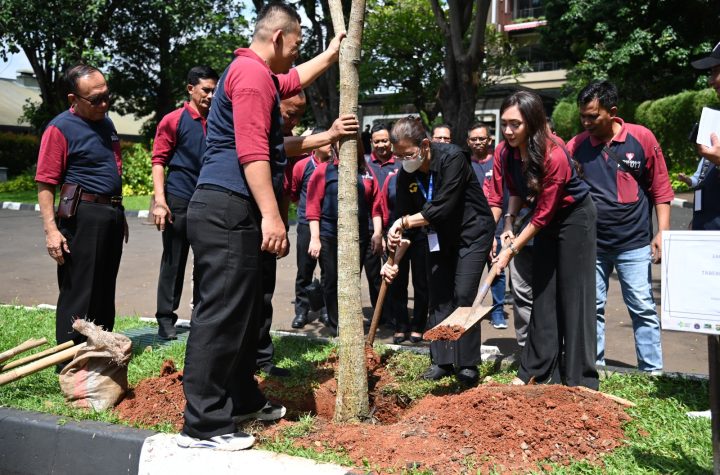
Ready to prey: Agam, a male tiger from Aceh rests in a cage before being released in the park on July 2008. Tigers in the park have preyed cattle owned by members of the local community. JP/Oyos Saroso H.N.
The Jakarta Post
Tue, March 02 2010, 11:43 AM
It was still daylight when Idai, a 40-year-old resident of Way Haru hamlet, Pangekahan village, Bengkunat Belimbing district, West Lampung, rushed out of the coffee estate where he worked to arrive home before sunset, for fear of breaching a curfew.
Since the release of Agam and Pangeran — two male tigers from Aceh — on the village border in July 2008, the district and Tambling Nature Wildlife Conservation (TNWC) authorities have prohibited locals from going out in the evening so as not to fall prey to the wild animals.
The Way Haru hamlet is deserted these days. Outdoor activity wind up before sunset, and housewives no longer dare to pick ripe coffee beans in the dark on their own.
Idai is one of about five hundred members of the Belimbing ethnic group refusing to move from their settlement, as suggested by officials from West Lampung regency, TNWC and South Bukit Barisan National Park (TNBBS).
As an native of Way Haru, Idai believes that leaving his hamlet and giving up the estate lands to TNWC means the end of the people of Belimbing.
The Belimbing community has been gripped by anxiety for 18 months now, not doing any work outside during evening hours.
Several months after the tigers were set free near their hamlet, dozens of goats and chickens were devoured.
“We’re sure the tigers from Aceh preyed on our livestock, because this had never happened before,” Idai said.
The Sumatran tigers from Aceh in Tambling were followed by another from Jambi called Salma on July 12, 2009, and two other males (Buyung and Panti), also from Aceh, on Jan. 27, 2010, thus posing a threat not only to the lives of the Way Haru people but to their livelihood.
Not only has the curfew shortened the amount of time locals can tender to their crops, but it is also threatening the livelihood of residents who used to catch fish and lobsters in local waters.
As of July 2008, no one in the region — including Way Haru residents — can fish from the beach.
On Oct. 29, 2008, security officers of a private company which manages the Tambling park, arrested Henizar 25 and Iwan 27 for fishing on Ujungkarang Slemat Beach, an area said to belong to the Belimbing people. The officers members searched village homes the next day and caught Nanang 26, Didik 24 and Dedi 23, who were blamed for having entered the conservation zone.
Claiming to have been tortured, the five Belimbing residents were released on Nov. 2, 2008.
However, they were obliged to do community work from 7 a.m. to 12 p.m.
”Fishing and catching lobsters have been part of our livelihood without which find it difficult to support our families. The five Belimbing locals were seized outside the TNWC,” said Khusairi Gelar Raja Muda, 52, head of the Belimbing ethnic community in Way Haru.
Khusairi added the security men had used knives and fired warning shots.
“We protested against such arrests for failing to follow proper procedures and for violating human rights. They [the men arrested for fishing] were questioned behind the security station and detained outside, exposing them to rain. They were trampled on and beaten,” Khusairi said.
Finally, they were forced to sign statements not to use the natural port of Belimbing which, since the Dutch colonial period, has served as a sea transportation lane.
“Way Haru people are also banned from going along the road and fishing outside the conservation zone. This area has belonged to the Belimbing community for a long time. Tiger conservation has made our life even harder. The arrests and detention have become a form of terror to prompt the hundreds of Belimbing people to leave,” he pointed out.
Khusairi maintained the community would not move.
“Moving the Belimbing tribe means the end of the existence of Belimbing ethnicity. We will continue to resist,” he said.
Ichwanto M. Nuh, secretary of the Nusantara Community Alliance (AMAN) Lampung branch, said
that since the acts of intimidation had started, Belimbing community figures had sought protection from the Legal Aid Institute (LBH) of Bandarlampung and AMAN. The LBH reported the case to the Lampung Police, but no settlement is forthcoming.
”They requested protection in view of the insecure situation in their own hamlet. Besides the fear of tigers, they are afraid of TNWC’s security personnel heavy handling. With the military having withdrawn from Tambling, residents find it hard to earn a living as the civil security members are fiercer,” Ichwanto M. Nuh said.
Feishol Djausal, TNWC chief representative in Lampung denied the alleged torture by the company’s personnel.
“Don’t blow up the case. They were captured but immediately released. There was no torture. They were caught for entering the conservation zone in the TNBBS. If everybody is allowed to enter freely without strict guard, the zone suffer damage, like other areas in Lampung,” said Feishol.
Head of the TNBBS Center Kurnia Rauf concurred, saying a memorandum had been signed with the TNWC to safeguard the marine conservation area around the Tampang-Belimbing (Tambling) zone.
According to Rauf, the TNWC, in addition to managing forests in Tambling for tiger and other wildlife conservation with field operations handled by the company’s members, cooperates with the TNBBS Center in maintaining 21,600 hectares of marine conservation areas in Tambling coastal waters.
“So anybody found fishing and catching lobsters on the beach near Tambling will be caught. Besides SGA and TNBBS security men, the marine conservation effort involves rangers and personnel from the directorate of forest protection and nature conservation [PHKA],” Kurnia Rauf added.
Tambling is little known to the outside visitor. Access to the forest zone belonging to the TNBBS is
not easy.
The TNWC was set up more than a decade ago. SAC Nusantara originally managed the zone, which turned a 100-hectare management rights area into a hunting park. But in 2003, the rights were transferred to a private company owned by a Jakarta tycoon in a joint operation arrangement, by making it a conservation zone.
In this 100-hectare area, the company conserved, among others, Sumatran tigers, crocodiles and leatherback turtles, and built a tiger rehabilitation center, a terminal, an airstrip for helicopters and several lodging houses.
Seen as successful in the rescue of wildlife and conservation of forest land, the company was granted the rights to manage the 45,000-hectare Tambling forest zone, around an eighth of the TNBBS (360,000 hectares).
If the zone is meant for conservation and ecotourism, environmental activists remain confused over the company’s real intentions.
“It’s because so far this zone has not been opened to the public, or to tourists,” said Mukri Friatna, an activist from the Indonesian Environment Forum (Walhi).
— Photos by JP/Oyos Saroso H.N.
sumber: http://www.thejakartapost.com/news/2010/03/02/threat-belimbing-community.html#sthash.WISoVxZ0.dpuf
See more at: http://www.thejakartapost.com/news/2010/03/02/threat-belimbing-community.html#sthash.WISoVxZ0.dpuf






More Stories
Peringati Hari Kesiapsiagaan Bencana 2024, Artha Graha Peduli Gelar Diskusi Online
“Planet vs Plastic” – Lestarikan Lingkungan Sebagai Investasi Masa Depan
JAKARTA FUTURES EXCHANGE BERSAMA ARTHA GRAHA PEDULI GELAR CSR TANAM MANGROVE DAN LEPAS SATWA DI PULAU SEBARU